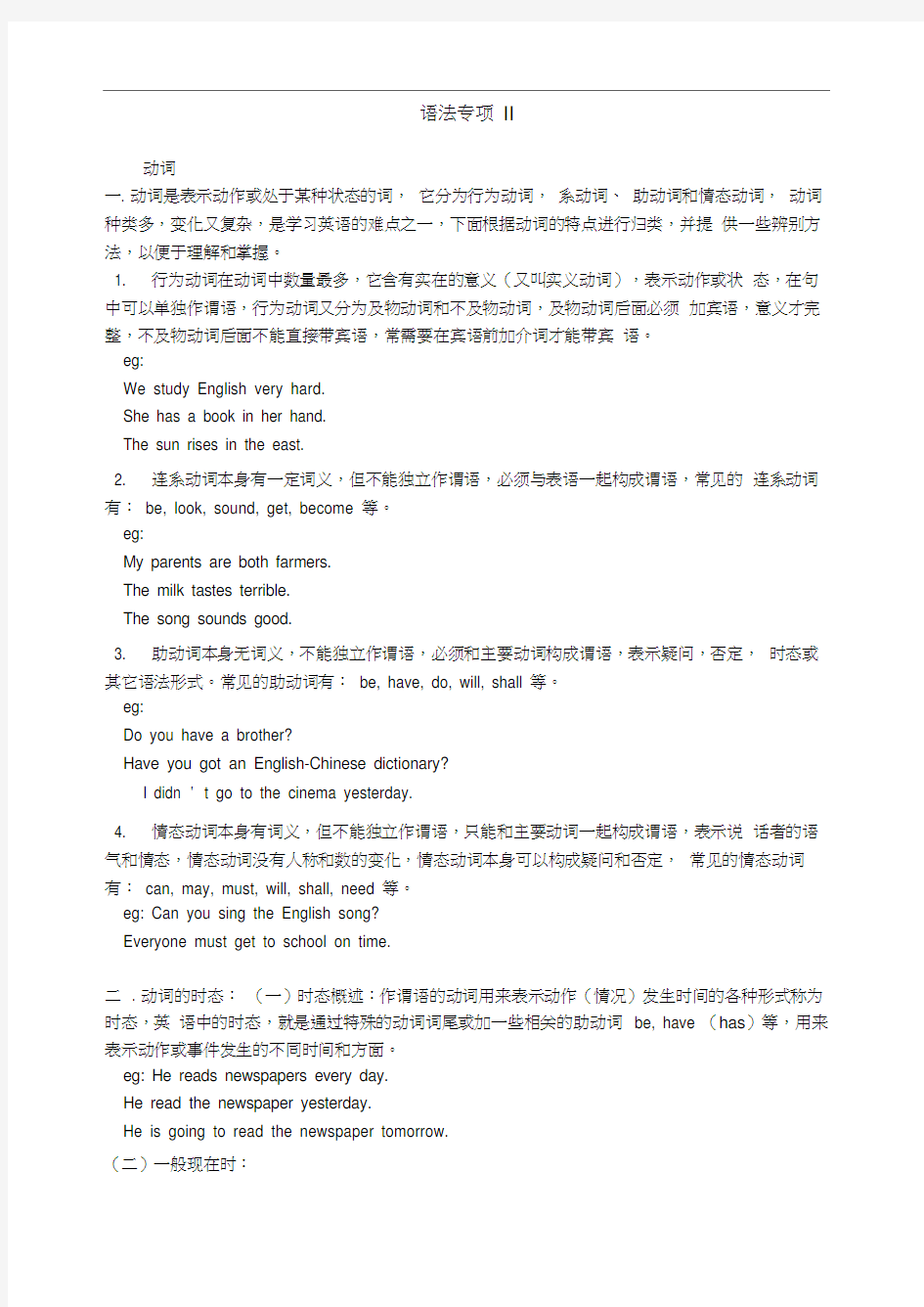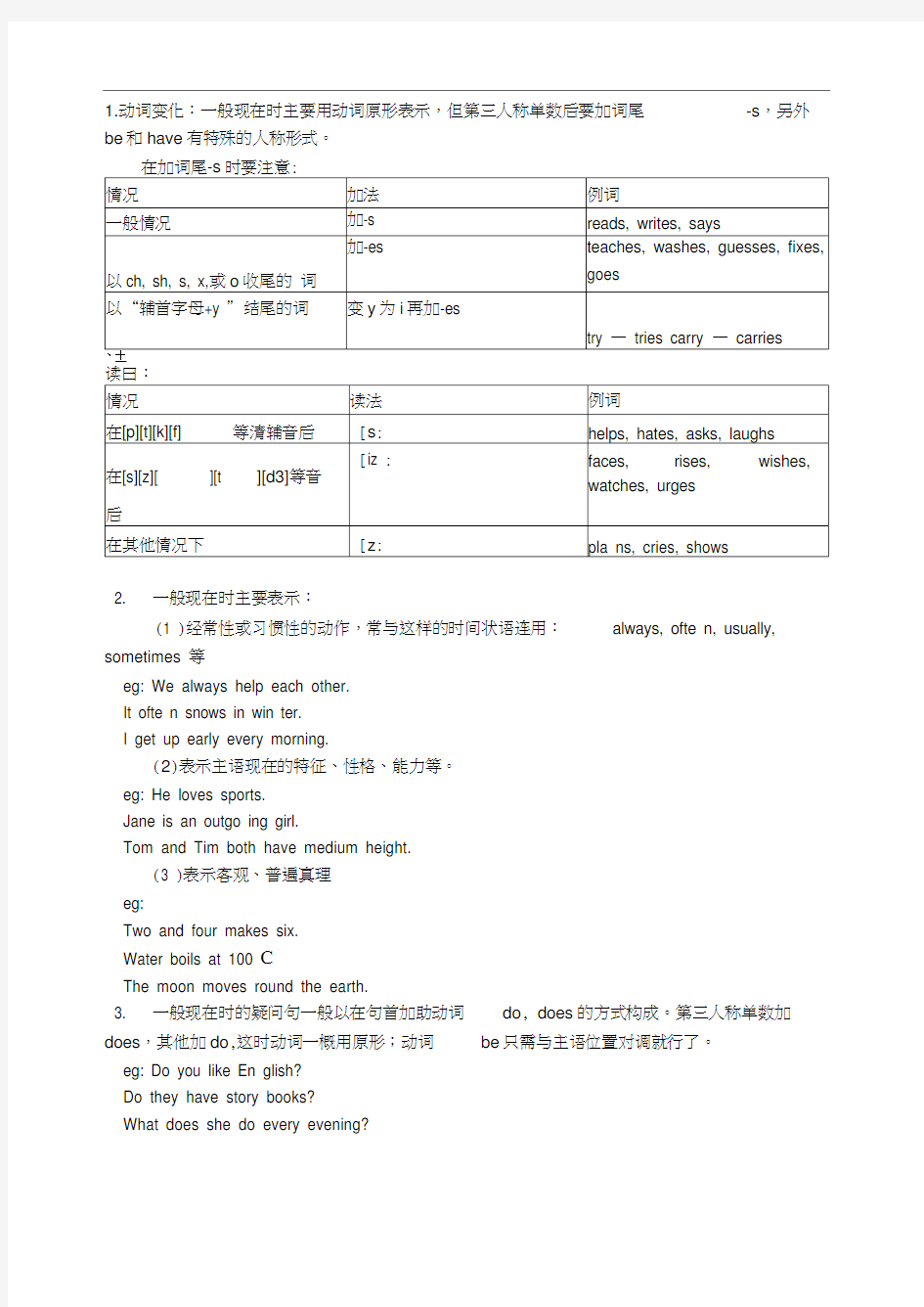

语法专项II
动词
一. 动词是表示动作或处于某种状态的词,它分为行为动词,系动词、助动词和情态动词,动词种类多,变化又复杂,是学习英语的难点之一,下面根据动词的特点进行归类,并提供一些辨别方法,以便于理解和掌握。
1. 行为动词在动词中数量最多,它含有实在的意义(又叫实义动词),表示动作或状态,在句中可以单独作谓语,行为动词又分为及物动词和不及物动词,及物动词后面必须加宾语,意义才完整,不及物动词后面不能直接带宾语,常需要在宾语前加介词才能带宾语。
eg:
We study English very hard.
She has a book in her hand.
The sun rises in the east.
2. 连系动词本身有一定词义,但不能独立作谓语,必须与表语一起构成谓语,常见的连系动词有:be, look, sound, get, become 等。
eg:
My parents are both farmers.
The milk tastes terrible.
The song sounds good.
3. 助动词本身无词义,不能独立作谓语,必须和主要动词构成谓语,表示疑问,否定,时态或其它语法形式。常见的助动词有:be, have, do, will, shall 等。
eg:
Do you have a brother?
Have you got an English-Chinese dictionary?
I didn ' t go to the cinema yesterday.
4. 情态动词本身有词义,但不能独立作谓语,只能和主要动词一起构成谓语,表示说话者的语气和情态,情态动词没有人称和数的变化,情态动词本身可以构成疑问和否定,常见的情态动词有:can, may, must, will, shall, need 等。
eg: Can you sing the English song?
Everyone must get to school on time.
二. 动词的时态:(一)时态概述:作谓语的动词用来表示动作(情况)发生时间的各种形式称为时态,英语中的时态,就是通过特殊的动词词尾或加一些相关的助动词be, have (has)等,用来表示动作或事件发生的不同时间和方面。
eg: He reads newspapers every day.
He read the newspaper yesterday.
He is going to read the newspaper tomorrow.
(二)一般现在时:
1.动词变化:一般现在时主要用动词原形表示,但第三人称单数后要加词尾-s,另外be和have有特殊的人称形式。
、十
2. 一般现在时主要表示:
(1 )经常性或习惯性的动作,常与这样的时间状语连用:always, ofte n, usually, sometimes 等
eg: We always help each other.
It ofte n snows in win ter.
I get up early every morning.
(2)表示主语现在的特征、性格、能力等。
eg: He loves sports.
Jane is an outgo ing girl.
Tom and Tim both have medium height.
(3 )表示客观、普遍真理
eg:
Two and four makes six.
Water boils at 100 C
The moon moves round the earth.
3. 一般现在时的疑问句一般以在句首加助动词do, does的方式构成。第三人称单数加does,其他加do,这时动词一概用原形;动词be只需与主语位置对调就行了。
eg: Do you like En glish?
Do they have story books?
What does she do every evening?
Is she at home? Are you good at English? 4. 一般现在时的否定式是 do not ( don ' t )或 does not ( doesn ' t )+动词原形来 构成的,
be 动词做谓语动词只需在 be 后加 not 构成否定。
eg:
I don ' t like oranges at all.
She doesn ' t work in the TV station. They aren ' t students. I ' m not busy every weekend. 三 . 现在进行时:
1. 动词变化:现在进行时由“ am/is /are +动词现在分词”构成。加 -ing 的规则如下: ( 1)
一般在动词原形末尾加 -ing 。如: stay -staying listen - listening work -working look -looking (2)以不发音的字母 make -making give -giving please - pleasing close
- closing
(3)以一个辅音字母结尾的重读闭音节词,先双写这个辅音字母,再加 put -putting
sit - sitting run - running begin - beginning 2.
现在进行时的用法
( 1)表示说话时正在进行或发生的动作,这时可以不用时间状语,也可以和 now, at
present, at the moment 等时间状语连用。 有时用一个动词,女口 look (看),listen (听)。
eg: What are you reading now?
Listen! Someone is singing in the classroom.
( 2)表示当前一段时期的活动或现阶段正在进行的动作。
eg: They are working in a factory these days. More and more people are giving up smoking. ( 3)表示最近按计划或安排要进行的动作。 现在进行时有时可表示一个在最近按计划或安
排要进行的动作, 时。 eg: When are you leaving? Are you going to Tibet tomorrow?
do -doing suffer - suffering spend - spending
e 结尾的动词,先去掉 e ,再加-ing 。如: take - taking
ride -riding
refuse - refusing operate - operating -ing 。如:
win - winning
即可以用来代替将来
3. 现在进行时的否定句和疑问句比较简单。否定句在疑问
be( am, is, are )后面力口not ;句把be动词移到主语前。
eg:
I am not work ing.
What are you readi ng now?
How are you feeli ng today?
The train isn ' t arriving soon.
四.一般过去时:
2. 一般过去时的基本用法:
(1)带有确定的过去时间状语时,要用过去时。( eg: yesterday, last year, just
now, two days ago, in the old days 等)
eg: He left just now.
Lei Feng was a good soldier.
What did you have for breakfast this morning?
(2)表示过去某一段时间内经常或反复发生的动作,这时常和表示频度的状语连用。
eg: Last term we ofte n did experime nts.
He always went to work by bus.
五.be going to 表示一般将来
1. 用法:表示现在打算在最近或将来要做的事,或表示说话人根据已有的迹象认为很有可能要发生的事情,be随着人称的变化变成(am, is, are )
eg: We are going to have a new subject this year.
It ' s going to rain this after noon.
I ' m going to be a pilot when I grow up.
2. be going to 的否定句在be动词后加上not ;be going to 的疑问句把be动词移到
主语前。
eg:
He isn ' t going to see his brother tomorrow.
I ' m not going to tell you about it.
Who s going to use it?
Is your sister going to bring your lun ch?
What are you going to do n ext Sun day.
【模拟试题】(答题时间:70分钟)
一.改错:
例1: The rose dark red. The rose is dark red.
1. He very likes swim ming.
2. He can helps you.
3. We haven ' t a good time.
4. What are you do after school every day?
5. Sometimes I listen music. sometimes I play outside.
6. The fish smells not good.
7. We should buy some chicken. There are little left.
8. There have many birds in the sky.
9. My mother ' s glasses is broken.
10. A pair of shoes are n early one thousa nd.
11. What colour are her hair?
12. Does he his homework?
13. A: Do you like your class?
B: Yes. I like.
14. He always do his shopping on Friday evening.
15. I very sorry I forgot your birthday.
16. I have no brother and sister.
二. 连词组句:
1. listen, morning, the, to, I, radio, the, in, often
2. of, men, nurses, good, sick, hospital, care, in, take, the
3. weekdays, he, the, goes, cinema, never, during, the, to
4. computer, got, new, you, a, have?
5. weekends, he, rest, does, a, got, have, on?
6. good, Li Ming, do, and, often, I deeds
7. museum, they, the, often, science, visit, how, do?
8. the, in, any, there, kitchen, food, is?
9. homework, does, day, when, Tom, his, every, where, and, do?
10. a, there, vegetables, many, but, apples , aren 't, lot, there, of, are, there
三. 用括号里的动词的适当形式填空:
1. There (be)_______some glasses on it.
2. He (go) ______ to the park every day.
3. My uncle (live )____ in Nanjing now.
4. ____ Lucy and Lily (like )______ China?
5. Li Lei (not like )__________ to drink orange soda.
6. The girl (go) ________ home at 4:30 in the afternoon.
7. ____ Kate (speak ) _____ French? Yes, she does.
8. Jim (not ride )________ his bike often.
9. If he (be) ______free tomorrow, he (go) _____ with us.
10. As soon as they (get )_______ there next month, he (call ) _______ m e.
11. ____ Li Ming 's father (have) __________ his lunch at home?
12. Tom (not do )______ the morning exercises often.
13. I (be) ________ hungry and my sister (be) _____ thirsty.
14. The baby (have )_______ curly hair.
15. Everybody (have)_____ a chance to win.
16. I (clean )________ my room once a week.
17. Nobody (tell )______ them anything.
18. There (be) _____ a lot of chicken on the plate.
19. Mr. Li (teach )_____ the second grade.
20. The boy (watch )_____ TV every evening.
21. Mary (play ) ______ t he violin quite well.
22. David (study )________ C hinese and I (study ) _______ English.
23. The game (be)________ interesting.
24. Many children (be)______ on the playground.
25. He (have)________ a good time at your party.
26. I (have )_________ a new bicycle.
四. 用所给词的适当形式填空:
1. Tom and his father _____ (swim)now.
2. Look! They ____ (run )along the street.
3. We ____ (practice )hard these days because we will have a big match next month.
4. What _____ he _____ (do)at nine o 'clock last night?
5. They _____ (listen )to the music at that time.
6. When the headmaster came in, the students ____ (read )the text.
7. We ____ (watch )TV when suddenly the telephone rang.
8. She ____ (make)the paper flowers the whole night.
9. A: _____ you _____ (studying )English?
B: Yes, I am.
10. Let ' s go out. It _____ (not rain )now.
11. Hurry up! Everybody _____ (wait )for you.
12. A: ____ (you / listen )to the radio?
B: No, You can turn it off.
13. I ____ (watch )TV at seven o ' clock yesterday evening.
14. A: What ____ (you / look )for?
B: I _____ (look )for my wallet. There is something important in it.
15. Look. It _____ (rain )hard. We ' ll get wet if we go out.
五. 选词填空:
(一)选词填空:
1. I _____ (am, is, was, were )busy last week.
2. Tom and I ____ (am, are, was, were )late for school yesterday.
3. I _____ (walk, walks, walked, walking )to school the other day.
4. Rose _____ (does not, didn 't, has been , has to )visit her uncle the month before last (month)
5. There ____ (is, was, are, were )a lot of people in this village ten years ago.
6. Mother ___ (am, is, was, were )ill in bed last night.
7. It _____ (rain, rains, rained, raining )a lot last year.
(二)用括号中动词的适当形式填空:
1. My uncle in London ____ (send)a birthday present to me yesterday.
2. When ____ (be)you born?
3. As soon as he arrived in the country, he ____ (phone)me.
4. When I ___ (knock )at his door, he was cooking.
5. We were watching TV when the light _____ (go)out.
6. He said he ____ (not like )maths at all.